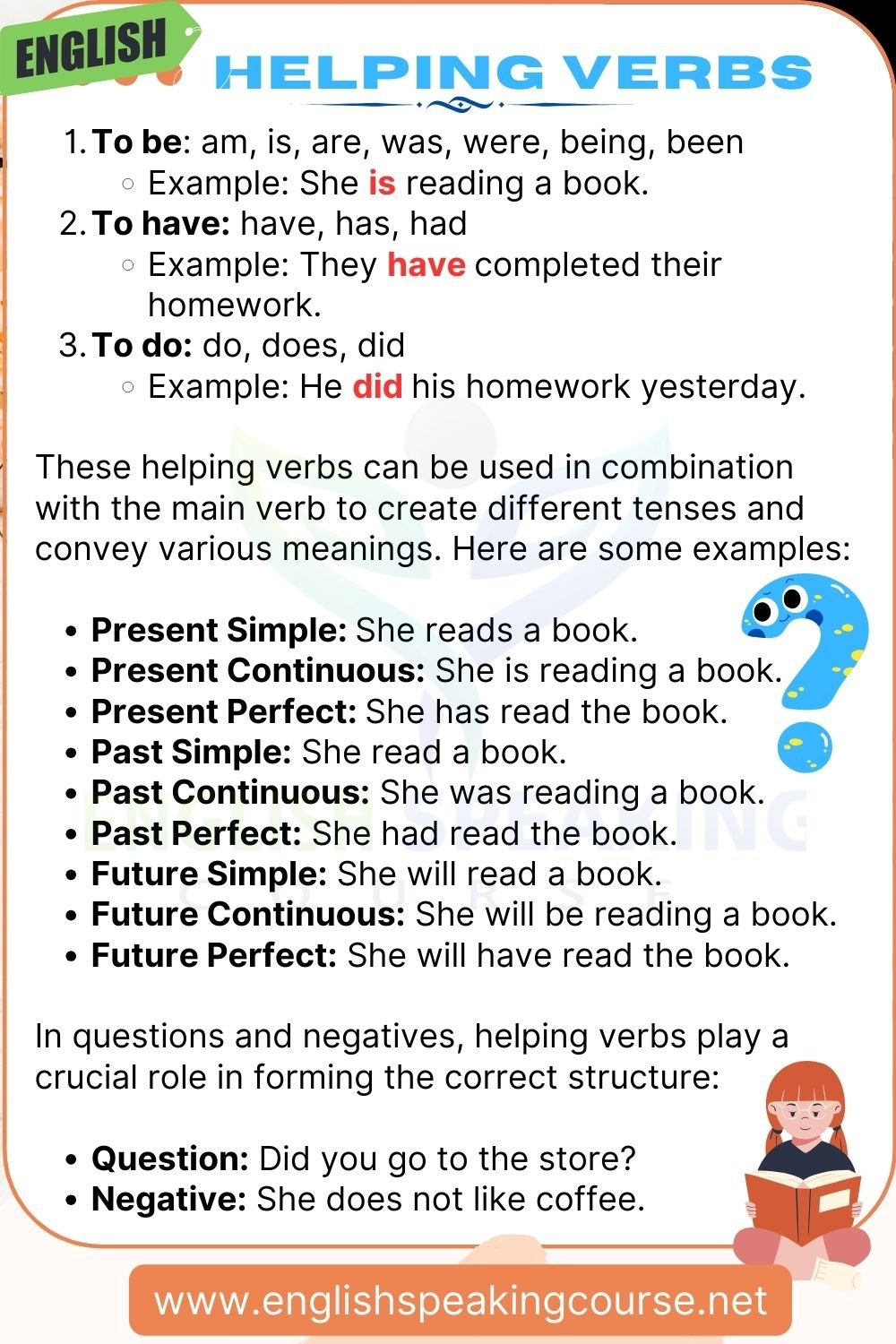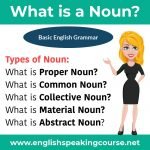Table of Contents
ToggleHow to use Helping Verbs?
Helping Verbs in English: Helping verbs, also known as auxiliary verbs, are verbs that are used alongside the main verb in a sentence to convey additional information about the main verb’s tense, mood, voice, or aspect. They “help” the main verb by providing more details about the action or state expressed in the sentence. The most common helping verbs in English are:
To be: am, is, are, was, were, being, been
Example: She is reading a book.To have: have, has, had
- Example: They have completed their homework.
To do: do, does, did
- Example: He did his homework yesterday.
These helping verbs can be used in combination with the main verb to create different tenses and convey various meanings. Here are some examples:
- Present Simple: She reads a book.
- Present Continuous: She is reading a book.
- Present Perfect: She has read the book.
- Past Simple: She read a book.
- Past Continuous: She was reading a book.
- Past Perfect: She had read the book.
- Future Simple: She will read a book.
- Future Continuous: She will be reading a book.
- Future Perfect: She will have read the book.
In questions and negatives, helping verbs play a crucial role in forming the correct structure:
- Question: Did you go to the store?
- Negative: She does not like coffee.
Using "am," "is," and "are" in English:
Helping Verbs in English
“am” (used with the pronoun “I”):
- Example: I am a student.
- Example (Negative): I am not a teacher.
- Example (Interrogative): Am I late?
“is” (used with third-person singular subjects – he, she, it, or a singular noun):
- Example: She is a doctor.
- Example (Negative): It is not raining.
- Example (Interrogative): Is he coming to the party?
“are” (used with plural subjects – we, you, they, or plural nouns):
- Example: We are friends.
- Example (Negative): You are not listening.
- Example (Interrogative): Are they ready for the meeting?
Making Interrogatives:
To form interrogative sentences using “am,” “is,” and “are,” you generally invert the subject and the corresponding helping verb. The basic structure is:
- “Am” + Subject + [rest of the sentence]?”
- Example: Am I late for the meeting?
- “Is” + Subject + [rest of the sentence]?”
- Example: Is she coming to the event?
- “Are” + Subject + [rest of the sentence]?”
- Example: Are they finished with their homework?
Making Negatives:
To form negative sentences, you usually add “not” after the helping verb. The basic structure is:
- Subject + “am not” + [rest of the sentence].
- Example: I am not interested in that topic.
- Subject + “is not” + [rest of the sentence].
- Example: She is not available right now.
- Subject + “are not” + [rest of the sentence].
- Example: We are not going to the party.
"was" and "were" in English
“was” (used with singular subjects – I, he, she, it, or a singular noun):
- Example: I was at the store.
- Example (Negative): She was not feeling well.
- Example (Interrogative): Was he at the party?
“were” (used with plural subjects – we, you, they, or plural nouns):
- Example: They were good friends.
- Example (Negative): We were not expecting guests.
- Example (Interrogative): Were you at the concert?
Making Interrogatives:
To form interrogative sentences using “was” and “were,” you generally invert the subject and the corresponding helping verb. The basic structure is:
- “Was” + Subject + [rest of the sentence]?”
- Example: Was she late for the meeting?
- “Were” + Subject + [rest of the sentence]?”
- Example: Were they excited about the news?
Making Negatives:
To form negative sentences, you usually add “not” after the helping verb. The basic structure is:
- Subject + “was not” + [rest of the sentence].
- Example: He was not aware of the changes.
- Subject + “were not” + [rest of the sentence].
- Example: We were not invited to the party.
Using "being" and "been" in English:
Helping Verbs in English
“being” (used as the present participle of “to be” in continuous tenses):
- Example: She is being very careful.
- Example (Negative): They are not being honest.
- Example (Interrogative): Is he being unreasonable?
“been” (used as the past participle of “to be” in perfect tenses):
- Example: They have been friends for years.
- Example (Negative): She has not been to the museum.
- Example (Interrogative): Have you been to that restaurant?
Making Interrogatives:
To form interrogative sentences using “being” and “been,” you generally invert the subject and the corresponding helping verb. The basic structure is:
- “Is/are/am” + Subject + “being” + [rest of the sentence]?”
- Example: Is she being honest with us?
- “Have/has/had” + Subject + “been” + [rest of the sentence]?”
- Example: Have they been informed about the changes?
Making Negatives:
To form negative sentences, you usually add “not” after the helping verb. The basic structure is:
- Subject + “is/are/am not” + “being” + [rest of the sentence].
- Example: He is not being helpful.
- Subject + “have/has/had not” + “been” + [rest of the sentence].
- Example: We have not been to that city.
Helping Verb - Do, Does, Did
“do” (used with base form of the main verb in present simple tense for most subjects):
- Example: I do my homework every day.
- Example (Negative): She does not like coffee.
- Example (Interrogative): Do they play basketball?
“does” (used with the third-person singular subject – he, she, it, or a singular noun):
- Example: She does her job well.
- Example (Negative): It does not rain much here.
- Example (Interrogative): Does he speak French?
“did” (used in past simple tense):
- Example: They did their homework yesterday.
- Example (Negative): He did not attend the meeting.
- Example (Interrogative): Did you finish your book?
Making Interrogatives:
To form interrogative sentences using “do,” “does,” and “did,” you generally invert the subject and the corresponding helping verb. The basic structure is:
- “Do” + Subject + base form of the verb + [rest of the sentence]?”
- Example: Do you like pizza?
- “Does” + Subject + base form of the verb + [rest of the sentence]?”
- Example: Does she speak Spanish?
- “Did” + Subject + base form of the verb + [rest of the sentence]?”
- Example: Did they enjoy the movie?
Making Negatives:
To form negative sentences, you usually add “not” after the helping verb. The basic structure is:
- Subject + “do not” + base form of the verb + [rest of the sentence].
- Example: I do not understand the question.
- Subject + “does not” + base form of the verb + [rest of the sentence].
- Example: She does not like crowded places.
- Subject + “did not” + base form of the verb + [rest of the sentence].
- Example: We did not expect the result.
"have," "has," and "had" in English
Helping Verbs in English
“have” (used with the base form of the main verb in present simple tense for most subjects):
- Example: I have a car.
- Example (Negative): They do not have any pets.
- Example (Interrogative): Do you have a pen?
“has” (used with the third-person singular subject – he, she, it, or a singular noun):
- Example: She has a beautiful garden.
- Example (Negative): It has not rained for weeks.
- Example (Interrogative): Has he finished his work?
“had” (used in past perfect tense):
- Example: They had already left when I arrived.
- Example (Negative): She had not seen the movie before.
- Example (Interrogative): Had you met him before?
Making Interrogatives:
To form interrogative sentences using “have,” “has,” and “had,” you generally invert the subject and the corresponding helping verb. The basic structure is:
- “Have” + Subject + base form of the verb + [rest of the sentence]?”
- Example: Have they visited Europe?
- “Has” + Subject + base form of the verb + [rest of the sentence]?”
- Example: Has she completed the assignment?
- “Had” + Subject + base form of the verb + [rest of the sentence]?”
- Example: Had you ever been to a concert?




